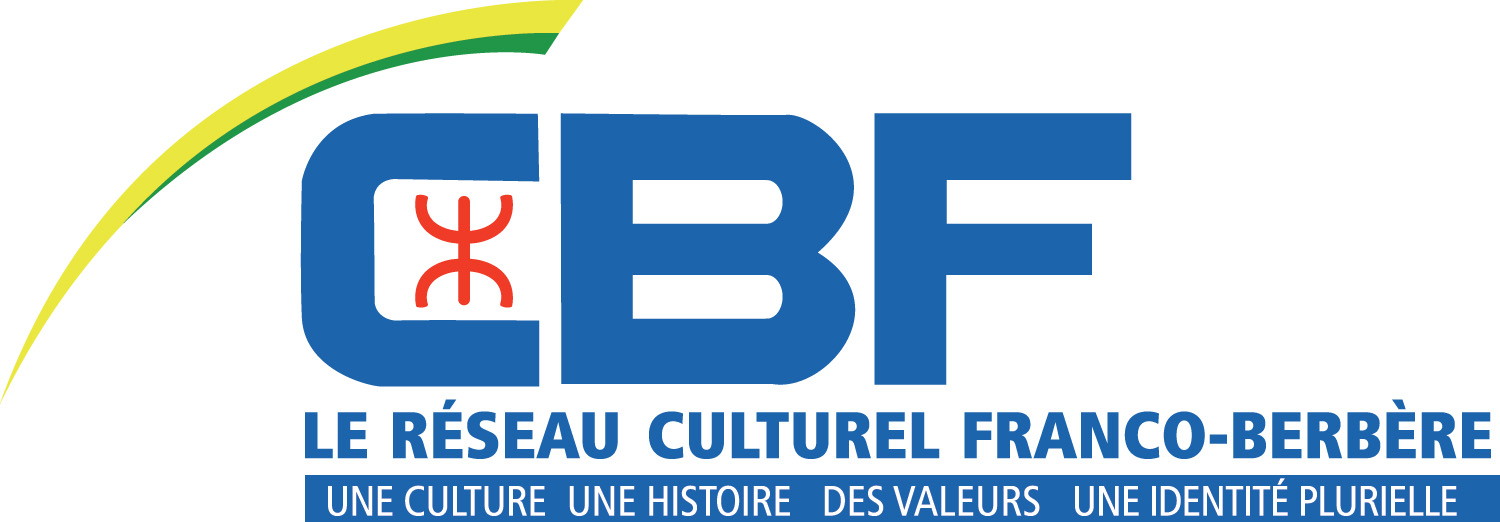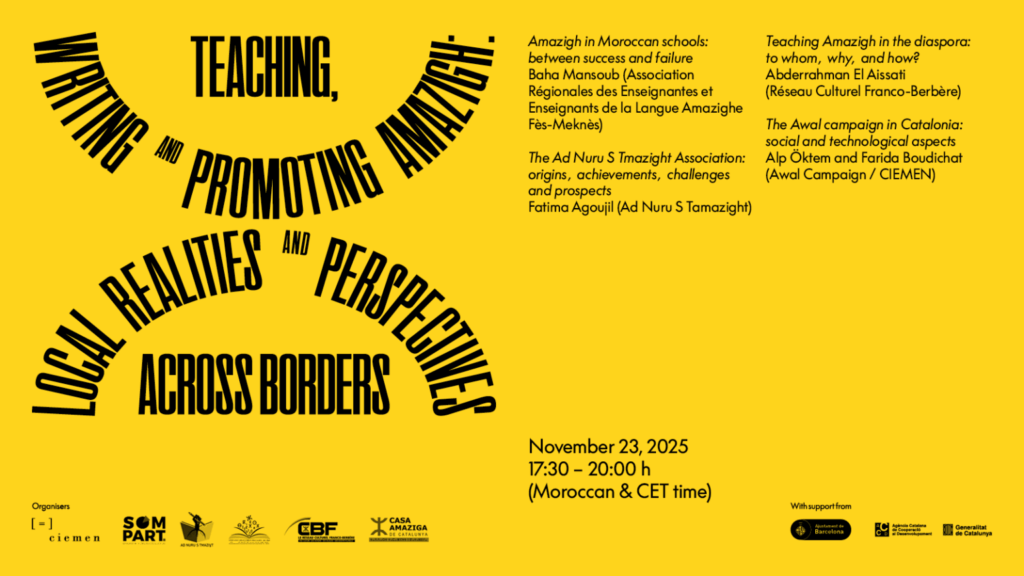El seminari
El seminari en línia “Ensenyar, escriure i promoure l’amazic: realitats locals i perspectives transfrontereres” explora l’ensenyament, l’escriptura i la promoció de la llengua amaziga en diferents contextos sociolingüístics. Investigadors i professionals del Marroc i d’Europa debatran els èxits i els reptes de l’educació en amazic, de les iniciatives culturals i de la innovació digital. A través d’experiències locals i perspectives transnacionals, l’esdeveniment posa en relleu les realitats actuals i els camins de futur per enfortir la visibilitat i la vitalitat de l’amazic. El seminari tindrà lloc en anglès i francès, amb traducció simultània entre les dues llengües.
L’enllaç per poder-s’hi connectar és: https://us06web.zoom.us/j/86472918135?pwd=J2c73XwQ1G07lo03MJwB9D7Om1Uldx.1
The seminar
This online seminar explores the teaching, writing, and promotion of the Amazigh language across different sociolinguistic contexts. Scholars and practitioners from Morocco and Europe will discuss the successes and challenges of Amazigh education, cultural initiatives, and digital innovation. Through local experiences and transnational perspectives, the event highlights current realities and future pathways for strengthening Amazigh visibility and vitality. The seminar will take place in English and French, with simultaneous translation available from one language to the other.
The seminar is organized by CIEMEN, Ad Nuru S Tamazight, Association Régionales des Enseignantes et Enseignants de la Langue Amazighe Fès-Meknès, Réseau Culturel Franco-Berbère and Casa Amaziga de Catalunya, with funding from the Catalan Agency for Development Cooperation and the Barcelona City Council.
Program and schedule
Sunday 23 November 2025
17:30 – 20:00 h (Moroccan & CET time)
Session 1.
“L’amazighe à l’école marocaine : entre réussite et échec”. Baha Mansoub (Association Régionales des Enseignantes et Enseignants de la Langue Amazighe Fès-Meknès)
La présente intervention a pour objectif de dresser un bilan sur l’état de l’enseignement de l’amazighe au Maroc depuis 2003 jusqu’à nos jours. Il sera question, d’abord, de parler des acquis et réalisations dans le domaine de l’enseignement de la langue amazighe à l’école primaire marocaine ; ensuite, nous nous intéresserons aux défaillances et reculs connus par ledit enseignement. Enfin, nous proposerons des recommandations concrètes et des perspectives d’avenir permettant de garantir à l’amazighe une place pleinement effective, durable et équitable selon la vision des professionnels élaborée par L’Association régionale des Enseignantes et Enseignants de la langue amazighe Fès-Meknès.
Session 2.
“Association de Ad Nuru S Tmazight: naissance, réalisations, contraintes et perspectives”. Fatima Agoujil (Ad Nuru S Tmazight)
Le présent papier vise une présentation de l’association Ad Nuru des écrivains en Amazighe. Il sera premièrement question d’évoquer les conditions ayant permit sa naissance. Deuxièmement, une étude quantitative portera aussi bien sur les réalisations que les activités effectuées par ladite association. Troisièmement, nous nous intéresserons aux contraintes rencontrées par Ad Nuru ainsi qu’aux perspectives d’avenir.
Session 3.
“Teaching Amazigh in the diaspora: to whom, why, and how?”. Abderrahman El Aissati (Réseau Culturel Franco-Berbère)
The experience of cultural associations in organising Amazigh courses will be addressed. A state of the art regarding the teaching of Amazigh in the diaspora will be presented. This will be followed by an exploration of the diverse needs of teachers in the field of curriculum development, and the identity dynamics experienced in learning Amazigh will be examined.
Session 4.
“The Awal campaign in Catalonia: social and technological aspects”. Alp Öktem and Farida Boudichat (Awal campaign / CIEMEN)
This presentation shares the experience of the Awal initiative in Catalonia, focusing on both community engagement and technology development for Tamazight. We discuss the achievements and challenges encountered during 18 months of crowdsourced data collection through the awaldigital.org platform, examining barriers to participation and key learnings about working with languages in complex sociolinguistic contexts.
You can join the seminar through this link on 23 November 2025 : https://us06web.zoom.us/j/86472918135?pwd=J2c73XwQ1G07lo03MJwB9D7Om1Uldx.1

